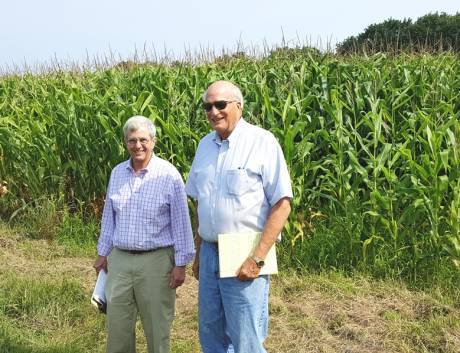Corn seed manufacturer agrees to pay $1.4 billion to farmers
When asked if it this is what he has been hoping for, attorney M. Scott Barrett didn’t hesitate.
“It sure as heck is,” said the Indiana lawyer regarding the news that Syngenta AG has agreed to pay more than $1.4 billion to U.S. farmers who filed suit against the Swiss agrochemical company for misleading marketing tactics in connection with its rollout of the Agisure Viptera corn seed in 2010.
The settlement was announced late Tuesday night, said Barrett, who has been working with Albion lawyer Conrad Cropsey and others in an effort to reach corn growers in the GLOW region.
Barrett, in an email sent to local media Thursday, reported that this agreement involves more than 100,000 farmers in the United States, but other growers who have yet to opt in still have an opportunity to do so.
“First, this is no longer a matter of telling your corn producer readers that they may get money if they hire a lawyer to represent them. This is now a done deal,” he wrote. “If your corn producer readers hire a lawyer to represent them in this matter, they will get money.”
Barrett said a deadline to join the suit is uncertain, but believes that it could be based on the date that a farmer signs a contract to hire a lawyer to represent him or her in the settlement.
“There will also be a deadline later on to file a claim,” he said. “The later deadline to file a claim is not time sensitive as of today- - it can be dealt with later on. The corn producers’ critical task now to participate in the settlement is to hire a lawyer to represent him or her in the settlement.”
Litigants contended that Syngenta did not get approval from China to distribute the seed, which was found to have contained a seed trait (MIR 162 GMO) that the Chinese deemed unacceptable.
In 2013, China embargoed all U.S. corn and, as a result, corn prices declined sharply and American corn producers suffered extensive monetary losses.
Attorneys for Syngenta said that the company was not at fault because the seed wasn’t sold until U.S. approval was obtained and that it didn’t need China’s approval.
Syngenta was acquired by China National Chemical Corp. in June for $43 billion.
According to a Bloomberg article, the settlement nearly equals the $1.5 billion that Syngenta generated in net income last year, on total revenue of $12.8 billion. It also was reported that Syngenta was expecting to pay between $1 billion and $2 billion to resolve the corn litigation.
Barrett expects USDA Farm Service Agency offices to be “overwhelmed” with Form 578 requests since that is the form required to submit claims. He advises corn growers to contact their FSA office as soon as possible and request the Form 578 for 2011-2016.
For further information, contact Barrett at 317-431-1249 or 812-334-2600 or go to the Syngenta NY website at www.syngentanycornlitigation.com.


